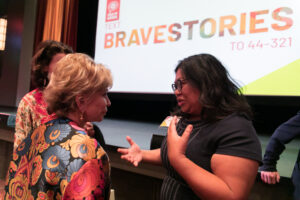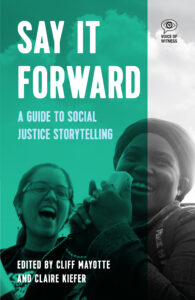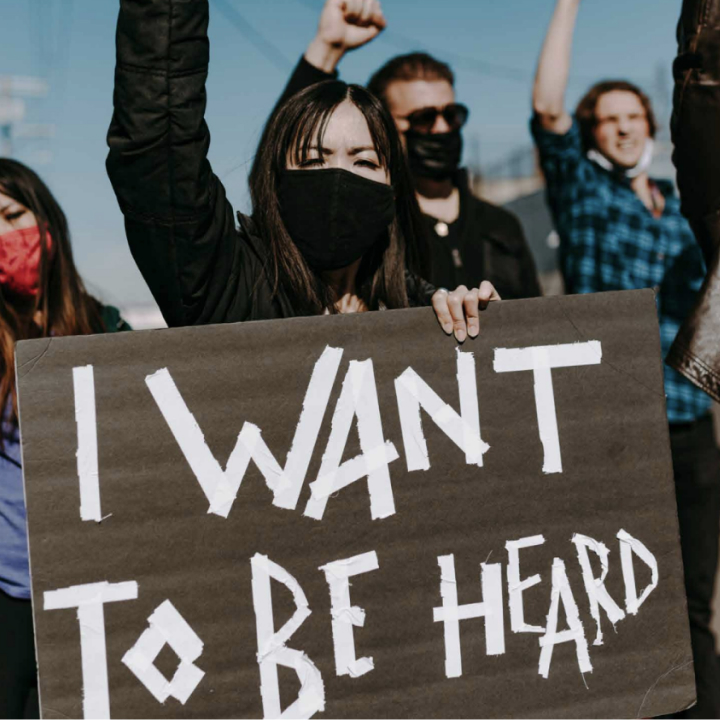VOW’s Ethical Storytelling Principles
The following ethical storytelling principles are informed by VOW’s 15+ years of experience conducting ethics-driven oral history and centering the voices of people impacted by—and fighting against—injustice. We are grateful for our community of partners, narrators,* editors, and advocates who helped shape these core tenets. While we approach storytelling through an oral history methodology (learn why), these principles are relevant to many forms of community-based storytelling. This framework is grounded in values of respect, dignity, empathy, transparency, collaboration, and equity.
Want to learn more? Check out our upcoming events and workshops.
1. Invest in relationships to build trust, mutual respect, and collaboration.
Relationship building, partnership, and co-creation at every stage—with narrators and project partners such as direct service organizations—are key to an ethical process. Investing in partnerships and moving “at the speed of trust” is vital in order to reject an extractive or transactional approach where someone “parachutes in” to collect stories and then abruptly leaves. Demonstrate empathy and compassion and prioritize narrator agency and dignity, supporting people’s ability to shape and tell their stories in a way that best reflects their truth. Stay in touch with narrators after the oral history process, developing the relationships further and connecting narrators to organizations, movements, and more opportunities to share their stories if they are interested.
2. Prioritize ongoing informed consent and transparency throughout the process. Ensure narrators have ownership and control over their stories.
Before a project begins, narrators should be fully informed on the scope and purpose, their participation, how their narratives will be used or shared, and who the audiences are. Clearly communicate that narrators have the right to opt out or request their narrative be retracted at any time during or after the project. Offer anonymity and pseudonyms to protect privacy, and discuss any possible safety concerns in advance. Provide multiple opportunities to share drafts, edits, and approval. The narrator should always have ownership over their own story.
3. Honor authenticity, complexity, and the whole person, rather than approaching with preconceived expectations or framing narrators as victims or heroes.
Let narrators take the lead in where the conversation goes, creating space for nuance and showcasing the joy, wonder, strength, and humor in addition to any potential trauma or hardship. Stories should not portray narrators as one-dimensional victims or heroes but instead challenge implicit biases, resist simplicity, and use strength-based framing. Prepare in advance by learning about the history, current events, and context of the narrator communities you’ll be working with, in order to be ready to listen, understand complexities, and ask thoughtful follow-up questions. During the editing process, honor and respect the narrator’s authentic voice, syntax, and linguistic patterns.
4. Use a trauma-informed approach.
Sharing one’s story with someone fully committed to deep listening can often be a healing experience. However, recounting traumatizing experiences can also be painful and lead to retraumatization. It’s vital to be supportive and responsive, including avoiding potential triggers, soliciting ongoing input, and respecting narrators’ self-determination and right to opt out. Actively provide choices to narrators, such as selecting the location of interviews or specific interviewers, whenever possible. Trauma-informed care is a framework through which practitioners understand the far-reaching impacts of trauma on people’s lives, recognize the signs of trauma, and prioritize emotional well-being and the prevention of retraumatization in their interactions with narrators. Come equipped with specific strategies and referrals to professional support systems. For more tips, read VOW’s trauma-informed practices resource.
5. Position narrators as the experts.
Narrators are the experts of their lived experiences, and those who are most deeply impacted are at the heart of solutions to address injustice. Oral history storytelling can make space for stories that otherwise might not be heard and create a platform for narrators impacted by—and fighting against—inequity to share their expertise. Approach projects with humility and an expectation of ongoing learning. This creates an opening for the narrator to teach and the interviewer to listen deeply.
6. Acknowledge and mitigate power dynamics and biases.
An ethical approach to storytelling requires examining power dynamics within a project. Understanding one’s positionality and openly reflecting on power, privilege, and representation is vital to developing more equitable and inclusive ways to document and share stories. This includes addressing the social, cultural, and historical forces that shape the stories; understanding insider/outsider dynamics and identifying interviewers that will make narrators feel most comfortable; and ensuring the storytelling process is mutually beneficial to narrators by discussing their own goals for the project. Based on the project and context, consider compensating narrators for their time.
7. Ensure stories are accessible to narrator communities.
Reflect on the ethical considerations related to narrator agency and access. For example, how can a given project’s publication or archive design choices (e.g., books, websites, podcasts, community center exhibitions, etc.) create reliable access for the communities that shared their stories? What collaborations or partnerships should be pursued that best reflect that commitment? Input from project participants can help inform and shape these decisions.
Additional Resources
VOW offers expert storytelling and program support to organizations, educators, advocates, artists, and more. These collaborations harness the power of oral history to promote empathy, learning, community-building, and action. We partner to develop customized, interactive projects, workshops, and activities, using our oral history methodology to advance your mission. Work with us!
Use the following resources to learn more:
- Subscribe to the VOW newsletter to access more tools and webinars
- Say It Forward: A Guide to Social Justice Storytelling
- The Benefits of Oral History: A Primer
- The Power of the Story: The Voice of Witness Teacher’s Guide to Oral History
- Immigrants Rising Storytellers Bill of Rights
- Oral History Association Social Justice Task Force Commission Summary and Recommendations Report
* As oral history practitioners, we use the term “narrator” rather than “interviewee” or “interview subject” to refer to the person sharing their story, as people are narrating their own experiences rather than simply providing answers to questions. Other organizations might use the term “storyteller” instead.
Download the Resource
* Required fields
More Support
Building partnerships with individuals, communities, and organizations is critical to our work.

Work With Us
We offer training and project support for ethical storytelling, oral history, and education. Let’s partner!

Resource Library
Check out our free storytelling resources, oral history guides, and lesson plans for inclusive education.

Workshops
We offer free and paid workshops on oral history best practices, storytelling ethics, and curricular development.

Contact Us
Questions or interested in connecting with the Voice of Witness team? Drop us a line!
Say It Forward: A Guide to Social Justice Storytelling
Dive deeper with Say It Forward, our DIY guide that offers strategies and resources for creating justice-driven oral history projects. For many years, Voice of Witness has shared powerful stories of people impacted by and fighting against injustice. Say It Forward extends this work, providing guidance for community-based storytelling by outlining the frameworks, ethics, and methodology at the core of our oral history work.

A vital guide from a vital organization, and it couldn’t come at a more critical time. More stories, please, and more justice—and more stories justly told.
Lauren Markham
Author, The Far Away Brothers


